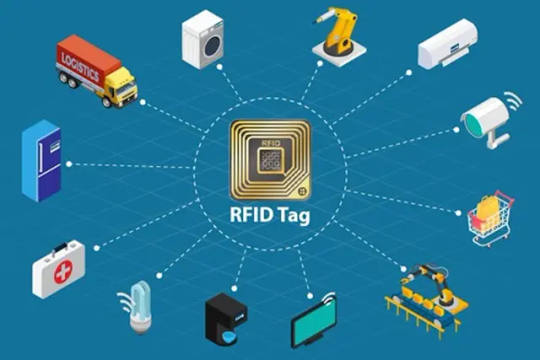#ChiplessRFID
Explore tagged Tumblr posts
Text
Chip-less RFID Market Drivers: Innovations, Cost Reduction, and Industry-Wide Adoption Fuel Growth
The chip-less RFID market is gaining momentum across global industries as businesses seek cost-effective, sustainable alternatives to traditional RFID systems. Without relying on microchips, chip-less RFID technology uses materials like conductive polymers, metallic inks, or printable resonators to encode data, offering a simpler, scalable solution for real-time tracking and authentication. Several key drivers are fueling the rise of this market, from advancements in material science to the increasing demand for low-cost asset tracking in large-scale operations.

One of the most influential drivers of the chip-less RFID market is cost reduction. Traditional RFID tags involve silicon chips, which significantly contribute to production expenses. In contrast, chip-less tags eliminate the need for silicon semiconductors, resulting in a dramatically lower cost per unit. This advantage makes chip-less RFID particularly attractive for applications requiring high-volume tag deployment, such as inventory tracking in retail or supply chain management. As manufacturing costs continue to fall due to economies of scale and better production techniques, chip-less RFID becomes increasingly feasible for widespread use.
Sustainability and environmental concerns also play a major role in the growing interest in chip-less RFID. With increasing pressure on companies to reduce electronic waste and carbon emissions, chip-less RFID systems offer an eco-friendlier alternative. Many chip-less tags are recyclable or biodegradable, addressing both environmental impact and regulatory compliance. As global regulations tighten around e-waste management and sustainability practices, industries are turning to chip-less solutions to align with green initiatives without compromising functionality.
Technological innovation is another powerful driver. Recent breakthroughs in smart materials, nanotechnology, and printable electronics have expanded the capabilities of chip-less RFID. For instance, advanced conductive inks now allow for the creation of high-performance tags that can be printed directly onto packaging or integrated into labels, enabling seamless product identification. These innovations open the door to smart packaging, brand authentication, and anti-counterfeit measures, which are especially vital in pharmaceuticals, food safety, and luxury goods.
The expanding adoption of the Internet of Things (IoT) is creating a ripple effect across the RFID landscape. IoT ecosystems require real-time data collection from countless interconnected devices and assets. Chip-less RFID fits this need well, particularly in scenarios where affordability and large-scale deployment are critical. As smart environments proliferate—from warehouses and transportation systems to smart cities—chip-less RFID becomes an enabler for efficient, sensor-free tagging that supports accurate data transmission and automation.
Another driver is the growing need for item-level tracking in sectors such as retail, healthcare, and logistics. Retailers are embracing chip-less RFID to manage stock levels, prevent theft, and streamline checkout processes. In healthcare, these tags are being explored for patient identification, medication monitoring, and equipment tracking—all without adding electronic complexity. For logistics providers, the simplicity and durability of chip-less tags make them ideal for harsh environments where traditional RFID tags may fail.
Customization and flexibility are further accelerating market uptake. Chip-less RFID tags can be designed to suit specific applications, from moisture detection to temperature monitoring. Their ability to be printed on various substrates—like paper, plastic, or textiles—makes them adaptable across product types and usage conditions. This versatility opens the door for integration into everything from clothing tags to automotive components, fostering innovation across industries.
Despite the market's promising outlook, challenges remain. Limited read range, lower data capacity compared to chip-based RFID, and interoperability issues with existing infrastructure are concerns that technology providers are working to address. Nonetheless, continuous research and development are narrowing these gaps, and pilot projects across various sectors are yielding encouraging results.
In conclusion, the chip-less RFID market is being driven by a powerful combination of economic, environmental, and technological forces. As industries continue to seek smarter, greener, and more affordable tracking solutions, chip-less RFID is positioned to play a pivotal role in the next generation of identification technologies. With ongoing innovation and increased industry collaboration, this market is set to redefine how we approach tagging, tracking, and real-time data acquisition in an increasingly connected world.
0 notes
Text
Beyond the Chip: The Evolving Chipless RFID Market
The Chipless RFID market is undergoing a transformative evolution as innovative technologies redefine the landscape of identification and tracking solutions. Unlike traditional RFID tags that rely on integrated circuits, chipless RFID employs inventive techniques such as conductive inks and unique patterns to encode and transmit information.
This approach offers advantages in terms of cost, size, and compatibility with various materials, making it an appealing solution for industries seeking versatile tracking solutions. The market's growth is driven by applications across sectors like retail, logistics, healthcare, and agriculture, where chipless RFID's capacity for efficient, real-time tracking without the constraints of traditional microchips is highly valuable. As industries embrace the potential of connected systems and data-driven insights, the chipless RFID market is poised to revolutionize asset management, inventory tracking, and authentication processes.
Request For Free Sample : https://www.globalinsightservices.com/request-sample/GIS10147
#ChiplessRFID #InnovativeTracking #ConnectedSystems #AssetManagement #DataDrivenInsights
0 notes